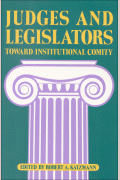“The Judiciary and Congress not only do not communicate on their most basic concerns; they do not know how they may properly do so,” writes Frank M. Coffin, a federal appeals court judge and former representative, in Judges and Legislators. “The condition is that of a chronic, debilitating fever.” Though the Senate lavishes it’s attention from time to time on particular judicial nominees, Congress remains largely oblivious of the wellbeing of the federal judiciary as an institution. And the judiciary seems often unaware of the critical nuances of the legislative process. This state of affairs has had an adverse effect not only on relations between the two branches, but also on public policy more generally. Some forty-five people—including a Supreme Court justice, federal and state court judges, legislators and legislative staffers, scholars, and members of the private bar—gathered for a series of discussion to identify fundamental issues affecting judicial-congressional relations. The articles published in this volume are an outgrowth of those discussions.
Authors
Edited by

Robert A. Katzmann is a visiting fellow in the Governmental Studies program at the Brookings Institution, president of the Governance Institute, and professor of government and law at Georgetown University. A lawyer and political scientist, he has a wide range of practical experience in judicial-congressional relations, including service as a special counsel in a Supreme Court confirmation process, a member of a judicial selection screening committee, and director of a project on statutory communication between the branches. He also worked with the U.S. Judicial Conference Committee on the Judicial Branch and the Federal Judicial Center. He is the editor of The Law Firm and the Public Good (Brookings/Governance, 1995) and Judges and Legislators: Toward Institutional Comity (Brookings, 1988) and coeditor of Managing Appeals in Federal Courts (Federal Judicial Center, 1988).
